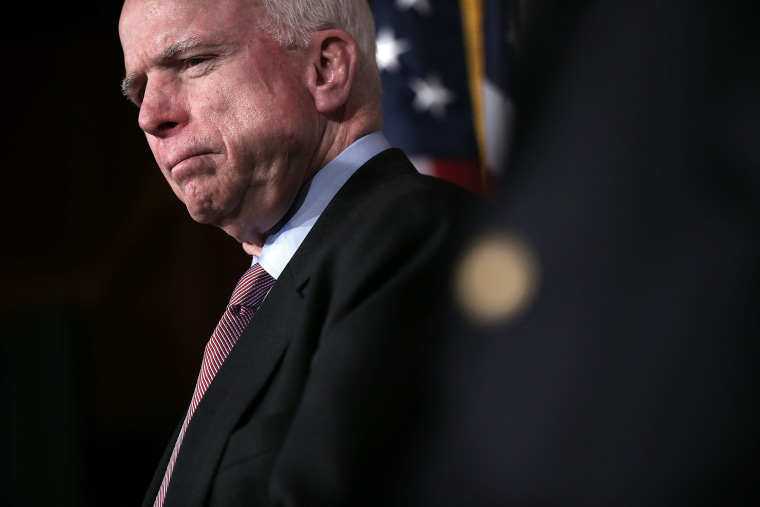Sen. John McCain (R-Ariz.) has been ailing in recent months, and this past weekend, the senator's office issued a statement noting that he'd undergone an additional surgery to treat an intestinal infection related to diverticulitis. McCain was described as being in stable condition.
Those close to the senator are, of course, hoping for a speedy recovery that would allow him to return to Capitol Hill. In Arizona's Republican-controlled state legislature, however, there's an effort underway to change how members of Congress who give up their seats are replaced. The state Associated Press reported overnight:
U.S. Senate vacancies are filled by a governor's appointee, with the seat on the next general election ballot. The secretary of state has interpreted that to mean that if McCain's seat is vacated by May 31, it would be on the August primary and November general election ballot. The new proposal changes that to 150 days before the primary, or March 31 of this year. [...]The Legislation was originally intended to lengthen the time required for a special election for a vacant U.S. House seat and was prompted by the scramble to replace Trent Franks, a longtime Congressman who stepped down in December amid sexual misconduct allegations.
In other words, someone in the state Senate wants to take McCain's seat out of play, should the senator no longer be able to serve, preventing voters from choosing a successor this year.
This isn't going to work. Steve Farley, a Democratic state senator, told the AP, "They're trying to make it really easy to appoint someone to two and a half years without an election to a U.S. Senate seat should the current holder of that Senate seat resign or no longer be able to hold office. The thing is, we're all going to vote against it as Democrats, so they won't get their emergency. It's silly for them to put it on and think we won't notice."
But it's also unseemly that they'd try.
Postscript: Slate had a related piece a couple of weeks ago on developments in Arizona: "Under the most common reading of the state's election laws, if McCain leaves the Senate before May 30, the ensuing special election would follow the same schedule as a regular midterm one: Party primaries would be held in August, and then the race would be decided on Nov. 6. But if McCain were to leave after May 30, his appointed successor would most likely get a free ride until 2020. Given the way the current political winds are blowing, both nationally and in Arizona, the two parties' electoral preferences are clear even if neither will say them aloud for obvious reasons: Republicans would rather defend the seat in 2020; Democrats would prefer to expand the battleground map this fall."
Arizona is already poised to host one U.S. Senate race this year, with Sen. Jeff Flake (R) retiring.
